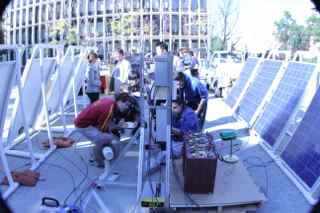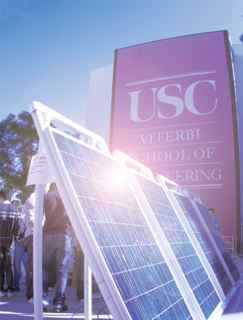Engineering for Energy & the Environment
Striving for Sustainability
 Energy and environmental sustainability are major challenges facing the world. As the population of the world grows and becomes more technologically sophisticated, technological advancement is required to utilize the finite resources of the Earth in a sustainable way--through conservation, reuse, recycling and exploiting renewable resources. Water sources and air quality must be monitored and protected, and their sustainability designed into manufacturing, operations, and use of products in the buildings we inhabit.
Energy and environmental sustainability are major challenges facing the world. As the population of the world grows and becomes more technologically sophisticated, technological advancement is required to utilize the finite resources of the Earth in a sustainable way--through conservation, reuse, recycling and exploiting renewable resources. Water sources and air quality must be monitored and protected, and their sustainability designed into manufacturing, operations, and use of products in the buildings we inhabit.
Modern society has been architected around the assumption of infinite energy supplies. Pervasive use of cloud computing and the resulting rise of data and hosting centers have brought forth concerns including the electrical energy cost, peak power dissipation, cooling, carbon emission, etc. The dominance of finite fossil fuels in the generation of energy for transportation and electricity generation inevitably poses the issue of future exhaustion of supplies. Energy sources, regardless of origin, create environmental impacts that must be addressed. Engineering breakthroughs have extended the supply of low-cost fossil fuels through novel drilling and recovery processes, including the recent exploitation of abundant shale gas resources, but their finite nature and associated environmental impacts pose important questions. Exploiting energy sources that are sustainable and renewable and pose less environmental impact is an important challenge that must be faced, as well as the adoption of technologies that utilize available energy sources more efficiently. The Viterbi School's Energy Initiative will contribute to the solution of these problems by addressing the following questions:

Student built solar panels power electric GEM cars.
The world economy is likely to utilize fossil fuel for decades to come; how can we improve the gas and oil recovery and distribution methods to improve efficiencies, minimize environmental footprint and extend the life of reserves? How can we improve the recovery of natural gas from source rock (shale gas)? What is the best approach for carbon capture and sequestration? How can we improve the utilization of coal, which is widely used in many parts of the world, despite adverse environmental impacts? In our globally interconnected world, small increases in such efficiencies can have a tremendous impact. Can new technologies that improve the efficiency of energy utilization in all aspects of human endeavor, including lighting, manufacturing, communications and computation, be employed to reduce their impact on the environment and extend available energy sources? How can we apply engineering principles that conserve and recycle materials, assess the full life cycle of products and buildings, and employ technologies that monitor the efficient use and operation of products and processes?
Can we develop efficient and cost-effective technologies for generation and storage of energy from intermittent sources like the sun, the wind, and tidal motion? What role will nanotechnology play in revolutionizing these technologies? What new engineering systems can be implemented to insure the quality of, access to and distribution of water utilizing technologies such as novel separation chemistry, wastewater treatment, and environmental microbiology? Can combustion processes involved in transportation and electricity generation be made significantly more efficient through a deeper understanding of their chemistry and novel ignition? How do we address the important issue of power, from generation to propulsion to the exploration of deep space?
 Can we develop novel approaches for secure integrated operation of diverse energy systems (e.g., the smart grid) and distribution networks through effective use of communication, control, and information technology (including using big data)? Can these be studied and managed as cyber-physical social systems? How can we develop a theory for understanding energy-complexity of computational tasks, and combine energy complexity with time complexity of applications, so that we can perform fundamental energy-performance tradeoffs at both hardware and application programming level and design and adaptively control energy-efficient data centers?
Can we develop novel approaches for secure integrated operation of diverse energy systems (e.g., the smart grid) and distribution networks through effective use of communication, control, and information technology (including using big data)? Can these be studied and managed as cyber-physical social systems? How can we develop a theory for understanding energy-complexity of computational tasks, and combine energy complexity with time complexity of applications, so that we can perform fundamental energy-performance tradeoffs at both hardware and application programming level and design and adaptively control energy-efficient data centers?
Published on December 9th, 2016
Last updated on April 10th, 2020







